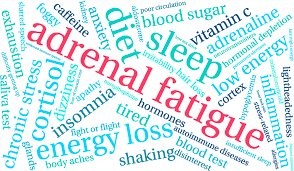What You Need to Know About Adrenal Fatigue
Chances are you
have heard of adrenal fatigue, but you may not be quite sure what it is. Understanding this condition is important
however, because some experts suggest that 80% of the Western world will be
affected by adrenal fatigue at some point in their lives.
The adrenal
glands are located above the kidneys and are responsible for secreting more
than 50 different hormones that are essential for life. Among these are adrenaline, cortisol,
progesterone and testosterone. Because
they regulate so many important hormones, their proper function is critical for
many functions essential to life such as producing energy, balancing
electrolytes and storing fat.
These glands also
help you deal with stress. When you are
under stress, the adrenal glands engage many different responses in your body
to make it easier for you to handle that stress.
But during
periods of intense, prolonged stress or chronic illness, the adrenal glands
begin functioning below the level needed to maintain health and well-being in
the body. They still function but at
less than optimal levels. The result is
adrenal fatigue.
Symptoms of Adrenal Fatigue
There are some
symptoms that are common among people who are suffering from adrenal
fatigue. These include:
·
Feeling
tired for no reason
·
Craving
salty or sweet snacks
·
Morning
fatigue
·
Mid-afternoon
sleepiness
·
Increased
energy in the late afternoon
·
Decreased
sex drive
·
Mild
Depression
·
Weight
gain, especially around the waist
·
Forgetfulness
·
Low
body temperature
If you are
experiencing these symptoms, you may be suffering from adrenal fatigue.
Treatment
Treatment for
adrenal fatigue focuses on making changes to your lifestyle and diet. If you have minor adrenal fatigue, you can
expect to be better within 6-9 months.
Moderate to severe adrenal fatigue can take between 12-24 months to
heal, and severe cases can take even longer.
Stress: One
of the first things you should do is reduce the stress in your life. This may mean clearing your schedule,
reworking some relationships or learning time management skills. In order for your adrenal glands to heal, the
demands placed on them should be lightened.
Sleep: Sufficient sleep is
also important. The main repair work on
your adrenal glands takes place between 10 pm and 1 am. If you are prone to late nights, consider
training your body to go to bed earlier.
It is also a good idea to reduce or eliminate caffeine from your diet in
order to help you sleep more soundly.
Exercise: Adrenal
fatigue can also be helped by exercise.
Exercise regulates cortisol, relieves depression and increases blood
flow. Each of these benefits will
contribute to your recovery. Try to
exercise at least 20 to 30 minutes each day.
Supplements: Finally, adding supplements to your
diet can speed healing of adrenal fatigue.
Calcium, magnesium, vitamin C, E, and B complex are recommended. Also
try to avoid ‘junk’ food as much as possible.
Rather, add plenty of fresh fruits and vegetables to your diet.
If you suspect
you are suffering from adrenal fatigue, don’t be discouraged. You can start the recovery process by making
the above changes to your diet and lifestyle.
Sources:
http://www.naturalnews.com/019339_adrenal_fatigue_chronic_stress.html
http://www.healthremedies.com/adrenal_fatigue.html

Comments
Post a Comment